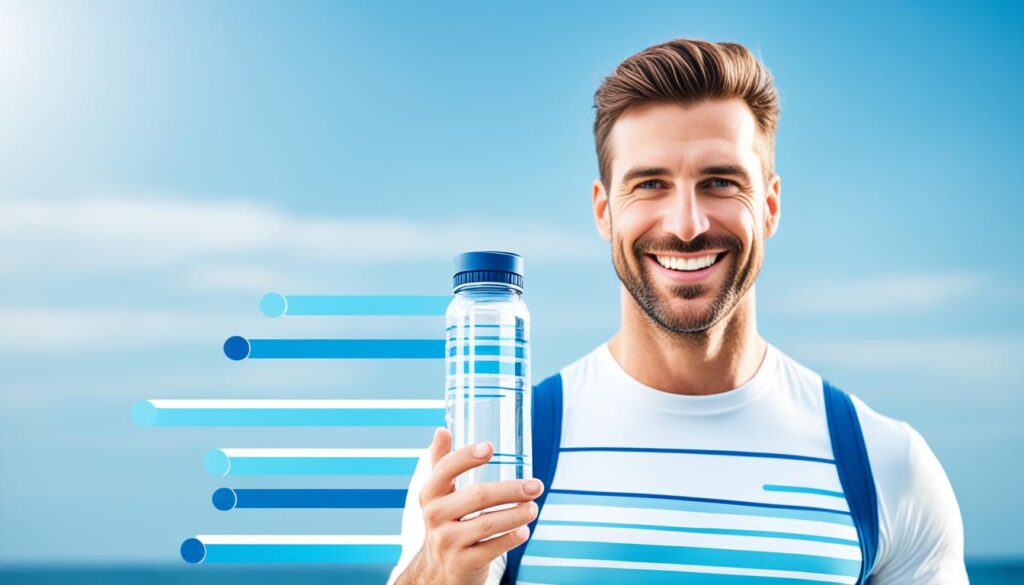Knowing how to stay hydrated is key for a healthy life. According to the Mayo Clinic, water makes up over half our body weight. It’s vital for all our cells, tissues, and organs to work well. Water helps get rid of waste, keeps our body temperature steady, helps our joints move, and protects our tissues. Not drinking enough water can make us feel tired and slow down how well our body works. The U.S. National Academies of Sciences suggests that adults living in normal weather should drink about 15.5 cups (3.7 liters) a day if male, and 11.5 cups (2.7 liters) if female. This count includes both drinks and the water in food. About 20% of your needed water normally comes from food1. It’s very important to drink enough water every day to be healthy. Use a water calculator to find out how much you personally need, based on how active you are, the weather, and your health1.
Why Is Hydration Important for Your Health?
It’s vital to know why drinking water is so important. Hydration helps your body work well. It cleans out toxins, carries nutrients, and protects your joints. If you’re not drinking enough water, you might feel dizzy or confused. You could even have seizures. Drinking water does more than just stop you from feeling thirsty. It helps you digest food, keeps your body temperature right, and makes your kidneys and bladder work well.
Drinking enough water stops you from getting dehydrated, which is really bad for your body. Experts say men should try to drink around 15.5 cups of fluids a day. Women should aim for 11.5 cups. And guess what? About a fifth of the fluid you need comes from the food you eat. The rest? It’s from what you drink1. Adults feel right by drinking water and other drinks when they’re thirsty1.
How much water you need depends on things like how active you are and the weather. For example, if you’re pregnant, you should drink 10 cups a day. And if you’re breastfeeding, you need about 12 cups2. Kids and teens, on the other hand, should have 6 to 8 cups of water. This amount changes with how much they move and how old they are2.
Not drinking enough water can cause big problems. Your digestion might slow down. You might not be able to control your body temperature well. Your kidneys and bladder could also suffer. On the other hand, drinking plenty of water is great for your joints. It helps your body get rid of waste, and it moves nutrients around well. And it makes sure you don’t get dehydrated. This all shows how good water is for you.
Daily Water Intake Recommendations
Drinking enough water is key for our health and it changes with who we are and what we do. Let’s look at what’s best for men, women, and moms who are pregnant or nursing.
For Men
Men should aim to drink about 15.5 cups (3.7 liters) of fluids every day. This includes all drinks and foods with lots of water in them1. They can reach this goal by not only drinking liquids but also eating water-rich foods, like fresh fruits and vegetables1. Another health guide suggests 13 cups (about 3 liters) as a good daily amount3. Staying well-hydrated is essential for men’s bodies to work at their best4.

For Women
For women, the daily recommended amount is around 11.5 cups (2.7 liters). This covers everything they drink as well as foods. Getting this much helps women’s bodies work right and stops them from getting too dry4. A different suggestion advises about 9 cups (a little over 2 liters) each day3.
For Pregnant and Breastfeeding Women
When you’re pregnant or nursing, you need even more water. For moms-to-be, it’s good to aim for 10 cups a day3. If you’re nursing a baby, try to drink about 12 cups daily3. These amounts keep you and your baby well-hydrated and healthy during these special times4.
Factors That Influence Your Hydration Needs
Many things affect how much water you need, like how active you are, the weather, and your health. Knowing these factors helps you drink enough water.
Exercise and Physical Activity
When you work out, you need more water. You sweat and lose fluid, so drinking water is vital. It’s key to hydrate before, during, and after to keep your body in balance and your workout effective.

| Action | Recommendation |
|---|---|
| Pre-exercise Hydration | Drink water 2-3 hours before exercise |
| During Exercise | Consume 0.5-1 cup every 15-20 minutes |
| Post-exercise Hydration | Replace fluids within 30 minutes |
Environmental Conditions
The weather also changes how much water you need. Hot, humid environments or high altitudes make you sweat more, needing extra water. It’s important to drink more water when it’s hot outside or if you’re working up a sweat.
Health Conditions and Illnesses
Your health impacts how much water your body requires. Fights in your body, like fever or stomach issues, make you need more water. If you’re sick, you might need even more water to help your body recover1. Staying hydrated is essential for managing illnesses.
How Much Water Should You Drink Daily? A Complete Guide
Finding the right amount of water to drink every day is not the same for everyone. It depends on things like how old you are, how active you are, and your overall health. The U.S. National Academies of Sciences, Engineering, and Medicine say that on average, men should drink about 15.5 cups (3.7 liters) a day and women about 11.5 cups (2.7 liters) a day. This includes all fluids you get from water, drinks, and food. Plus, roughly 20% of what you need each day comes from the food you eat1.
Kids and teens need different amounts of water each day. For example, younger children from 1 to 3 years old should drink about 4 cups daily. Older kids, between 4 and 8 years, should aim for 5 cups. College students and people with jobs should drink 6 to 8 cups of water each day. Pregnant women need about 10 cups daily, and those who are breastfeeding should drink around 12 cups to keep up their fluids3.
People who are very active, like athletes, have special needs for water. It’s suggested they drink a half cup to 2 cups of water every 15 to 20 minutes when they’re exercising. This helps keep them properly hydrated. But, drinking too much water without enough sodium during heavy exercise can be dangerous. It can dilute the sodium in the blood, which is called hyponatremia, and it’s a serious condition1.
Drinking enough water every day is key to good health. Water is essential for moving nutrients around the body, cleaning out toxins, and keeping your temperature just right. It’s a good idea to drink water with your meals, between meals, and any time you feel thirsty. Also, when you’re working out, make sure to drink water before, during, and after. Watching the color of your urine to make sure it’s light yellow or clear can help you tell if you’re getting enough water1.
FAQ
How much water should an average adult drink daily?
Why is hydration important for one’s health?
What are the water consumption guidelines for women?
How much water should pregnant and breastfeeding women consume daily?
How does physical activity affect water intake needs?
What impact do environmental conditions have on hydration needs?
How do health conditions and illnesses influence water intake?
Are there tools available to help calculate individual water intake requirements?
What percent of daily water intake typically comes from food?
What are the benefits of drinking adequate water daily?
Source Links
- https://www.mayoclinic.org/healthy-lifestyle/nutrition-and-healthy-eating/in-depth/water/art-20044256
- https://health.ucdavis.edu/blog/good-food/why-its-important-for-you-to-drink-water-and-stay-hydrated/2022/07
- https://www.webmd.com/diet/how-much-water-to-drink
- https://nutritionsource.hsph.harvard.edu/water/




